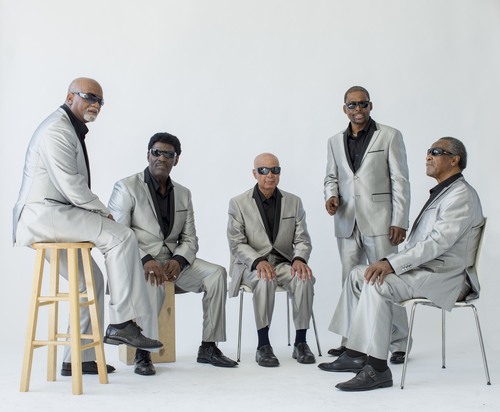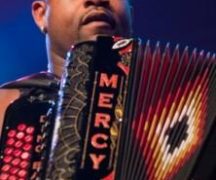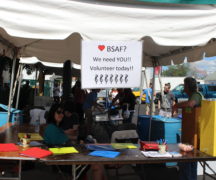By DAVID DUPONT
BG Independent News
The Blind Boys of Alabama are ready to pull listeners up by their roots at the Black Swamp Arts Festival.
The festival has always celebrated American roots music in its 25 years. But no other act can match the depth of the roots of the Blind Boys of Alabama. The band got its start as the Happy Land Jubilee Singers in 1938 at the Talladega Institute for the Negro Deaf and Blind in Alabama, and has been sharing the uplift of gospel music ever since.
They quit school to tour and later were renamed the Five Blind Boys of Alabama as a way to gin up competition with a similar group that was dubbed the Five Blind Boys of Mississippi. The band scored its first hit with “I Can See Everybody’s Mother But Mine” in 1948.
Starting when he was 9, lead singer Jimmy Carter has been along on the entire journey. (Another founder Clarence Fountain records with the ensemble but is unable to tour.)
The Blind Boys of Alabama will perform on the Main Stage of the Black Swamp Arts Festival, Saturday, Sept.9, at 8 p.m.
Over the years, the rhythms underneath those tight five-part harmonies have evolved, integrating funk, soul, blues, even rap. The vocals, though, have remained true to the band’s roots, said long-time member Ricky McKinnie.
“Our voices are what make us the Blind Boys,” he said. “The Blind Boys believe in good harmony. As long as we can keep the harmony as tight as it is, the better off we are.”
McKinnie, who sings second tenor and occasionally plays drums, started working with the band about 40 years ago and has been a member for 29 years.
Other members of the group are Ben Moore, baritone, Paul Beasley, tenor, and music director Joey Williams, guitar and vocals. “He’s the only sighted member of the group,” McKinnie noted.
The Blind Boys first broke into the mainstream when they performed in the musical “The Gospel at Colonus” in the 1980s. That exposed them to a wider audience and new collaborators from a variety of genres.
“We found out that what’s from the heart, reaches the heart,” McKinnie said. “So we try to reach the soul of a person. We don’t come to preach to people, we come to sing. We hope that our singing can make them feel good. We sing feel good music.”
While “we learn to change with the times,” he said, “The only thing that has changed is the style. … The words are still the same … because the word will forever stand.”
McKinnie said that the group will sing “any song that brings a strong message. We sing message music.”
It doesn’t matter if Ben Harper, Bonnie Raitt, Curtis Mayfield, Peter Gabriel, or Tom Waits wrote. “All these people brought music that has a strong message. … There’s a great need for those songs today.”
But those more contemporary message songs will be mixed with such traditional favorites as “Amazing Grace,” “Look Where You Brought Me From,” and “Precious Lord, Take My Hand.”
“It’s not a Blind Boys set without some traditional gospel,” McKinnie said “We sing traditional songs because that’s where we come from, that’s the basis of our longevity.”
He sees the Blind Boys continuing to spread that message. “As long as there are blind singers that love what they do, singing the gospel, and that respect the legacy of the Blind Boys of Alabama, there will always be a group called the Blind Boys of Alabama.”
The Blind Boys serve as a model for those perceived as being handicapped.
He said his motto is: “I’m not blind, I just can’t see. That means that I might have lost my sight, but I never lost my direction. And also a disability is just a limitation, and we all have limitations. It’s not about what you can’t do that’s important, it’s what you can do.”





